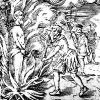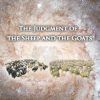Do Not be Surprized at This!
 It is amazing how the conscience1Conscience – The internal sense of what is right and wrong that governs a person’s thoughts and actions, urging him or her to do right rather than wrong. of human beings agrees with some of the most profound truths contained in the Bible. Although hidden from those steeped in religious dogma, one of the greatest truths that parallels most people’s innate sense of justice and equity is contained in John 5:28-29. This is where Yahshua spoke concerning the three eternal destinies of man.2Revelation 22:11
It is amazing how the conscience1Conscience – The internal sense of what is right and wrong that governs a person’s thoughts and actions, urging him or her to do right rather than wrong. of human beings agrees with some of the most profound truths contained in the Bible. Although hidden from those steeped in religious dogma, one of the greatest truths that parallels most people’s innate sense of justice and equity is contained in John 5:28-29. This is where Yahshua spoke concerning the three eternal destinies of man.2Revelation 22:11
“Do not be surprised at this: for the hour is coming in which all who are in the graves will hear His voice and come forth — those who have done good, to the resurrection of life and those who have done evil, to the resurrection of condemnation.”
(John 5:28-29)
What Yahshua taught was so incredible, so extraordinary to the religious thought of his day, that most were simply unwillingly to accept what He had to say. Indeed, that must be why Yahshua said, “Do not be surprised at what I am going to tell you!”
Nevertheless, he emphasized a profound truth that agrees with the instinctive3Instinctive – Relating to, prompted by, or based on a strong natural impulse, innate, unlearned, intrinsic, known directly without being discovered or consciously perceived. knowledge in man’s conscience: righteous people on earth, who persevere in the struggle of life to do good, will be rewarded with a resurrection of life.4John 5:28-29; Romans 2:6,7,10; Revelation 20:11-15; Hebrews 9:27 And the unrighteous who cast off the restraint of conscience, choosing rather to do evil, will likewise be recompensed according to their deeds with a resurrection of condemnation.5Romans 1:18,19,21-25,28-32; 2:8,9,11
This was so shocking, especially for the Jewish leaders! How could a Gentile, outside of Judaism, be granted eternal life? Impossible! They were incensed, considering his heretical teachings to be blasphemy. Yet, Yahshua made it clear that both the good and the evil would give an account on the Day of Judgment.6Romans 2:6-7 And on that day the secrets of men’s hearts would be fully exposed – being made evident by their deeds.
on that day the secrets of men’s hearts would be fully exposed – being made evident by their deeds.7Revelation 20:11-15
Just like those Jews, Christians who are biased by religious indoctrination think that rewarding good, upright people with eternal life would nullify the very gospel of Messiah and faith in His atoning work. However, it is evident that Yahshua did not think the same way, and even spoke openly about the three (not just two) eternal destinies of man — the holy, the righteous, and the wicked.
The Holy
Most assuredly, I say to you, he who hears My word and believes in Him who sent Me has everlasting life, and shall not come into judgment, but has passed from death into life. Most assuredly, I say to you, the hour is coming, and now is, when the dead will hear the voice of the Son of God; and those who hear will live.
(John 5:24-25)
Yahshua spoke of three distinct categories of humanity, each group having distinct eternal destinies. One category would be made of those who obediently responded to the gospel, as in John 5:24-25. They were spiritually dead in their sins, but found forgiveness in Yahshua when they heard and received the gospel. They live in communities, set apart from the rest of the world, just as the early church did.8Acts 2:44-45; 4:32-35; 2 Corinthians 6:17-18 Their lives verify their faith by their daily devotion to what He commanded His first disciples.9Luke 14:26-33; Matthew 28:20; Mark 10; etc This category is referred to as the Holy101 Peter 1:15-16; 2:9-10 or Redeemed of humanity, who live in subjection to God in Messiah’s Body, the dwelling place of His Spirit on earth. They knew one day that they would have to give account of their lives in the Body.112 Corinthians 5:10
But at the very same time in John 5:24-29, and in the same context, Yahshua spoke of two other categories of people on the earth.
The Righteous
The next category He spoke of were those people who promoted what was good and sought the welfare of their fellow man. They honored God by living according to the second covenant, which was made after the fall of Adam and Eve in the Garden. The prophet Isaiah would later refer to it as the everlasting covenant.12Isaiah 24:5,6; Genesis 3:16-19; 9:1-7 Its terms set forth universal standards for men and women. Even though the people who kept a good conscience as best they could were not included among the redeemed of humanity, they were worthy of a resurrection of life, as the Master said in John 5:28-29. They would serve an essential purpose for God throughout eternity.
They preserved the everlasting covenant of conscience, which was given to natural man after the Fall.13Genesis 3:16-19, 9:1-7; Is 24:5,6; Romans 2:19-21, 2:12-15 They did not abandon their better judgment or forfeit what they knew was right, but lived by that knowledge all their days. The intense struggle they experienced in life doing good, turning away from evil, qualified them to be a part of restored mankind, referred to in scriptures as the “eternal nations.”14Revelation 21:3,24,26; 22:2,11
The Unjust and Filthy
Messiah then recognized a third category of humanity who are fully deserving of eternal condemnation. According to Revelation 22:11, this category is divided into two classifications: the Unjust and Filthy.
“He that is unjust, let him be unjust still: and he which is filthy, let him be filthy still: and he that is righteous, let him be righteous still: and he that is holy, let him be holy still.”
The filthy and the unjust give themselves over to doing evil. They take pleasure in it, giving hearty approval to those who practice the same. They reject the natural law instinctively within their conscience in the pursuit of putting themselves first, seeking their own pleasures, indulging their lower appetites at the expense of other human beings. They are past feeling guilt for their deeds, so they become filled with all unrighteousness.15Romans 2:28-29; Ephesians 4:18-19 (NKJV) These people are not born that way, but become that way, as it takes a while to be “filled up” with such things. Over a long period of time, guilt accumulates within them and their consciences are overpowered. The evil things they fail to judge, but crave inwardly, transform their very nature and character.
This third classification of people among the nations will spend eternity apart from the holy and the righteous. Their place will be in the Lake of Fire. This eternal destiny is referred to in Revelation 21:8 as the Second Death, which is eternal — never ending. Those who are a part of this category of irreparable humanity became reprobate. They were unable and unwilling to be used for a greater purpose — being given over to unjust and filthy practices.
So, not only the redeemed — those who believe and obey Messiah — will receive eternal life, but plainly, those who suffer their whole life to resist evil to the best of their ability, choosing rather to do good, are also among those who will inherit eternal life. Both categories of mankind will work closely together in the ages to come.
The Earth – God’s Testing Ground
When God first created this world He knew that Earth was going to be the great testing ground for all humanity. Man passing that test was essential for what lay ahead in fulfilling His ultimate purpose in creation. That was why there had to be an examination to see who would qualify for the task ahead. The relationship or role between the earth and Man is an essential one and mysterious in a way. Every single thing that our Father created was made for the benefit of mankind: the air we breathe, the dew and rainfall upon the earth, the animal and plant life, etc. It is all there for us to care for and steward. No other planet has any evidence of life on it. Only Earth, the starting point of humanity.
Through the infinite foreknowledge of our Creator, His eternal purpose was to continually populate the entire universe with his highest creation – man. “Be fruitful and multiply; fill the whole earth and subdue it; exercise dominion over it.” In the beginning, this was God’s original mandate for all of humanity. But shortly after their creation, Adam and Eve fell, succumbing to the powers of evil, and so sin and death entered all of mankind. As a means of preserving what remained of man’s dignity, God established the everlasting covenant of conscience. Although now subject to the powers of evil, man was not left in a hopeless situation.
If there was not still great eternal significance to man’s choices, God would not have wasted his time in establishing this covenant with Adam and Eve after the Fall. If man was now “utterly depraved,” was God just trying to frustrate him by telling him to be fruitful and multiply? The respected doctors and theologians of Christian history, such as Calvin and Augustine, say that no good thing existed in mankind after the Fall. So, was God just trying to kick man around while he was down? No, obviously, there was still hope for man’s restoration through his obedience to this Covenant, despite his fall. All those born through Adam are still appointed to die once for sin, but not necessarily twice.16Hebrews 9:27
The penalty for sin is death (or Sheol in Hebrew). This is the place where the souls of human beings dwell after they die, to make payment for the sins they have committed while alive on earth. And it is here that they will remain until the Judgment. Then a determination will be made as to whether the debt for their sin has been recompensed while in death, or whether that person is still considered worthy of a Second Death.17There are two penalties for humanity as a result of sin: The first is called death (sometimes referred to as the First Death), which is temporary and will eventually come to an end at the time of the Last Judgment (Revelation 20:11-15). The other penalty for man’s sin is the Second Death, which is eternal. The deciding factor between the two for fallen man has everything to do with obeying Genesis 3:16-19 and 9:1-7 and Romans 1 and 2. These are the covenants God gave to fallen man and expected him to live by to the very best of his ability. After Adam and Eve fell, God held them (and all humanity that came from them) accountable for the knowledge they had now gained. What man did with that knowledge and how he used it or suppressed it would be evident by his deeds and would be the determining factor in his eternal destiny.
The Preservation of Mankind
Again, after the Flood, God commanded Noah to institute government among all the nations to keep order by punishing murder. All good laws stem from the fact that man is made in God’s image, and help men retain what is inherently known in their heart. Noah delegated this authority over to all the nations in order to establish law and order on earth. In so doing, the restraint of evil would be held in check. All societies of the earth would be free to exercise their right to promote the good and welfare of their nations, abiding by the covenants God gave to humanity in the very beginning.
Obviously, fallen man was capable of upholding authority and righteous rule on earth, although he was limited in his absolute powers to do so, due to sin having entered humanity. At the same time, God also once again commanded Noah, “Be fruitful and multiply; fill the whole earth and subdue it; exercise dominion over it.” It is clear that God’s intention was constantly to restore man to his original purpose in creation regardless of his fall. God could still recognize His image in righteous men like Noah; it gave Him something to work with.
The Task Ahead
Living on earth as a human being is not a light matter, but it is also not an impossible task God set before mankind. Innate within all humanity, God has placed the guiding light of conscience. It leads the way for all those in the nations who freely choose to obey what they know is right and good. Their plight in this life is not hopeless. In the final judgment, they will receive their reward of a second life among the eternal nations of God. Both the Righteous and the Holy will share an intimate relationship throughout eternity in bringing God’s rule and dominion throughout the expanse of the universe.
Their behavior on earth, God’s testing ground, will have proven them worthy to further God’s ultimate purpose throughout the endless expanse of the universe. There will be no limit to the original command to “be fruitful and multiply, replenish and take dominion.” But this time there will be one major difference. The serpent of old will no longer have any access to deceive them ever again. He will be cast into the Lake of Fire. Finally, the taint of evil over mankind will forever be gone.
Scriptural References and Other Footnotes




